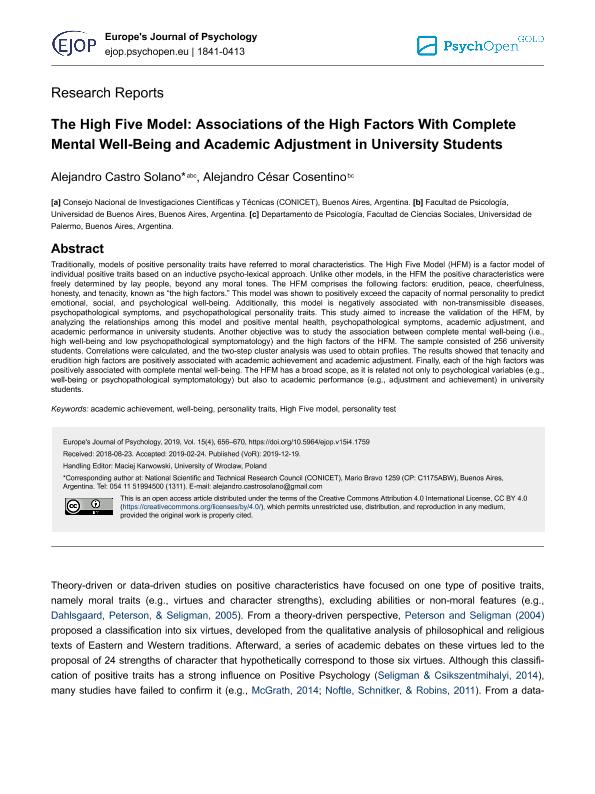Mostrar el registro sencillo del ítem
dc.contributor.author
Castro Solano, Alejandro

dc.contributor.author
Cosentino, Alejandro César

dc.date.available
2022-10-31T05:35:57Z
dc.date.issued
2019-12
dc.identifier.citation
Castro Solano, Alejandro; Cosentino, Alejandro César; The High Five Model: Associations of the high factors with complete mental well-being and academic adjustment in university students; PsychOpen; Europe's Journal of Psychology; 15; 4; 12-2019; 656-670
dc.identifier.issn
1841-0413
dc.identifier.uri
http://hdl.handle.net/11336/175508
dc.description.abstract
Traditionally, models of positive personality traits have referred to moral characteristics. The High Five Model (HFM) is a factor model of individual positive traits based on an inductive psycho-lexical approach. Unlike other models, in the HFM the positive characteristics were freely determined by lay people, beyond any moral tones. The HFM comprises the following factors: erudition, peace, cheerfulness, honesty, and tenacity, known as ?the high factors.? This model was shown to positively exceed the capacity of normal personality to predict emotional, social, and psychological well-being. Additionally, this model is negatively associated with non-transmissible diseases, psychopathological symptoms, and psychopathological personality traits. This study aimed to increase the validation of the HFM, by analyzing the relationships among this model and positive mental health, psychopathological symptoms, academic adjustment, and academic performance in university students. Another objective was to study the association between complete mental well-being (i.e., high well-being and low psychopathological symptomatology) and the high factors of the HFM. The sample consisted of 256 university students. Correlations were calculated, and the two-step cluster analysis was used to obtain profiles. The results showed that tenacity and erudition high factors are positively associated with academic achievement and academic adjustment. Finally, each of the high factors was positively associated with complete mental well-being. The HFM has a broad scope, as it is related not only to psychological variables (e.g., well-being or psychopathological symptomatology) but also to academic performance (e.g., adjustment and achievement) in university students.
dc.format
application/pdf
dc.language.iso
eng
dc.publisher
PsychOpen
dc.rights
info:eu-repo/semantics/openAccess
dc.rights.uri
https://creativecommons.org/licenses/by/2.5/ar/
dc.subject
academic achievement
dc.subject
well being
dc.subject
personality traits
dc.subject
five factor model
dc.subject.classification
Psicología

dc.subject.classification
Psicología

dc.subject.classification
CIENCIAS SOCIALES

dc.title
The High Five Model: Associations of the high factors with complete mental well-being and academic adjustment in university students
dc.type
info:eu-repo/semantics/article
dc.type
info:ar-repo/semantics/artículo
dc.type
info:eu-repo/semantics/publishedVersion
dc.date.updated
2022-10-27T10:21:37Z
dc.journal.volume
15
dc.journal.number
4
dc.journal.pagination
656-670
dc.journal.pais
Alemania

dc.journal.ciudad
Leibniz
dc.description.fil
Fil: Castro Solano, Alejandro. Universidad de Palermo. Facultad de Ciencias Sociales. Departamento de Psicología. Centro de Investigación y Posgrados; Argentina. Consejo Nacional de Investigaciones Científicas y Técnicas; Argentina
dc.description.fil
Fil: Cosentino, Alejandro César. Universidad de Palermo. Facultad de Ciencias Sociales. Departamento de Psicología. Centro de Investigación y Posgrados; Argentina
dc.journal.title
Europe's Journal of Psychology
dc.relation.alternativeid
info:eu-repo/semantics/altIdentifier/url/https://ejop.psychopen.eu/article/view/1759
Archivos asociados
